SUMMARY
This is AI generated summarization, which may have errors. For context, always refer to the full article.
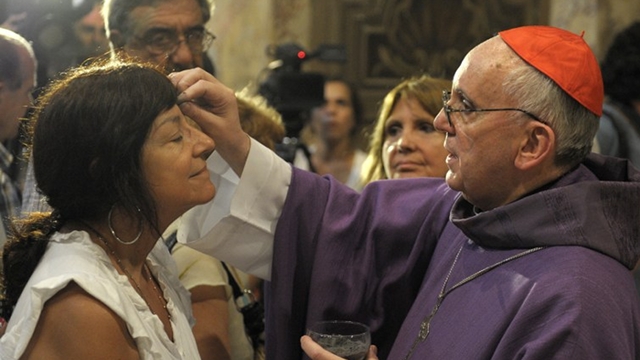
MANILA, Philippines – Pope Francis made history by being the first non-European pontiff in the modern era. What does his election mean to Catholics outside Europe?
Rappler gets to know Jorge Bergoglio of Argentina through the eyes of an Argentinian priest in the Philippines who knows him.
Fr Luciano Felloni tells the story of a man who not just commutes with ordinary Argentinians but also goes out on the streets to give them food, delivers crisp but meaningful homilies, and scolds priests who refuse to baptize children of unmarried couples.
Felloni, a diocesan priest in Novaliches who speaks fluent Filipino, shares stories about the new Pope, his style of leadership, and what he can teach Catholics in Asia and Latin America.
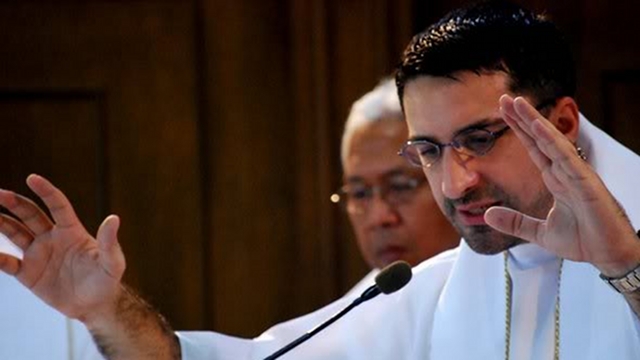
Here is our interview:
Q: How do you and Pope Francis know each other?
Nung seminarista ako, first year ko in the seminary, hindi pa siya obispo noon. Rector siya ng seminary ng mga Jesuit and our seminary was across the street. Once in a while, he would come to give us recollections. Tapos ‘pag kami naghahanap ng pari para mangumpisal, many times siya ang bababa so siya ang nakausap namin so kumbaga many times nakita ko siya the time na ‘di pa siya obispo. That was early 1990s, 1991-1992.
(When I was on my first year in the seminary, he was not bishop yet. He was rector of a Jesuit seminary across the street from our seminary. When we needed a priest for confession, sometimes he’d be the one to go down and we would talk to him. So I met him when he was not a bishop yet.)
Q: What was he like?
Naku very simple. Iyon ang unang salita na talagang lumalabas ‘pag nakita mo siya. Simple sa pananamit, simple sa pananalita. Simple in the sense na wala siyang kotse, nagco-commute, nagte-train, nagbu-bus. Simple dahil bumababa siya lagi sa mga tao so makikita mo sa mga parokya, sa mga kapilya, sa mga feeding programs. Very, very simple man.
Pagdating sa kanyang sermons, maikli pero malaman, very meaningful, very common language, iyong talagang maabot ng lahat. Simple sa pananalita but malalalim.
Very sharp mind, very shy sa kanyang pagkatao pero very approachable.
(He was very simple. That’s the first thing that comes to mind when you see him. Simple in his choice of clothes, simple in words. Simple in the sense that he did not have a car, would commute, ride the train and the bus. Simple because he would go down to the people in the parishes, chapels and feeding programs.
When it comes to his sermons, they were short but concise, meaningful. He would use common language, what everyone can understand. Simple in words but deep.)
Q: Is there one instance that stands out, one experience you’ve had with him?
One is his going out to feed the people in the streets of Buenos Aires, in the bad times of Buenos Aires. ‘Yung panahon ng big economic crisis, there were a lot of people living in the streets. ‘Yung Archdiocese of Buenos Aires put up a house but some of them wouldn’t go. Gusto nila talaga sa kalye (They really wanted to be in the streets) and the bishop would come out and bring food to the people.
I remember his homilies, very sharp, very simple language but very straight to the point. Then finally, just last month, he sort of reprimanded the priest because some priests in his diocese, they were not allowing people that were not married [have their children baptized] so he was angry and he said in a very pastoral way, “You cannot refuse baptism and don’t put yourself like you are holier than others.” So he has a very forceful, pastoral approach. He will really bring the Gospel to the people for sure.
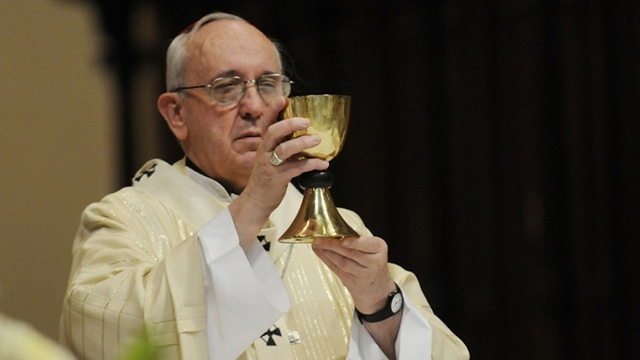
Q: What was his reputation in the community?
He has a very good reputation in the community dahil sa kanyang simplicity. His lifestyle is very poor, very simple, very approachable, social issues very outspoken, especially ‘pag may batas o kilos ang gobyerno na ‘di pabor sa mahirap, talagang gagawa siya ng statement, very sharp din ang kanyang statements so he has a reputation of being pro-poor. He has a reputation of really, parang balanse eh kasi medyo center-right his political views but he’s very socially inclined.
(His simplicity earned him a good reputation in the community. He was outspoken especially when there were laws or government efforts unfavorable to the poor. He would really make sharp statements. His political views were balanced.)
Q: What specific social issues did he make a stand on?
Mga taxes, taxation, some of the programs that are for the poor, dole-outs, he would reproach that, he would prefer a more developmental approach from the government. Iyan ang issues na naalala ko.
And then mga konkretong pangyayari sa Argentina, big accidents, sunog na maraming namatay, he would be there personally. Bumababa siya, nakikiusap sa pamilya. (When there were big accidents like fires which killed many, he would be there. He would go down and talk to the families.)
Q: Reports say he clashed with the Argentinian government on policies like same-sex marriage?
He will be very traditional in those positions, same-sex marriage, contraceptives. You will get a very strong position, traditional position, very orthodox position.
Q: His election was historic. He is the first non-European and Jesuit pope. What went through your mind when you heard the news?
I was totally surprised kasi naramdaman ko matunog siya noong nakaraang conclave but not this one so I was really thinking he was not the one but I was surprised kasi talagang knowing him personally, I know he can bring a lot to the Church, a lot of good things to the Church. Natuwa ako bilang Argentinian, higit sa lahat, natuwa ako na isang Latin American, isang kababayan, isang taong simple at very intelligent, very sharp, maraming katangiang maganda pero nagulat. We were not expecting him.
(His name was brought up as a contender in the past conclave but not this one. But I felt happy as an Argentinian, a Latin American, that we have someone simple and intelligent as pope. But I was shocked. We were not expecting him.)
Q: Why weren’t you expecting him to be chosen?
Una, yung edad. He is already 76. So nung nakaraang conclave, he was isa sa mga candidates but not this one. There was another Argentinian na akala namin, si Cardinal [Leonardo] Sandri and then may ibang pangalan na mas matunog on this conclave so ‘yung sa listahan ng mga papabile, hindi siya ang lumabas. There were 7 or 8 candidates but ‘di siya mabilang doon.
(One is age. We thought another Argentinian was a strong contender and other names. He wasn’t on the list of papabile that came out.)
Q: You said he will bring a lot to the Church. What do you expect from him?
I think he will bring simplicity, una sa lahat. Simple mula sa style ng pananalita, simple sa pagtanggal ng maraming superfluous things in the Church. He has a much poorer, simple lifestyle, easier to approach. Probably mas magshe-share ang more participatory ang style of governance. Sa katunayan mula sa unang araw ng pananalita, he always emphasized he is the Bishop of Rome. That gives the message he will be a bishop among bishops.
More participatory. He will give very good homilies, bring the message of the Gospel sa level ng mga tao.
(I think he will bring simplicity, first of all. Simple in speech, simple in taking out superflouous things in the Church. Maybe share more the participatory style of governance. I think he will bring the message of the Gospel to the level of the people.)
Q: You said he’ll be like Pope John Paul II?
He doesn’t have the charisma of John Paul II pero ang pagbaba niya sa mga tao, I think we will see more of him going around the world. I’m sure, visiting places, makikipag-usap sa mga karaniwang tao. We will see more of that, the image of the Pope sa gitna ng mga tao.
(He doesn’t have the charisma of John Paul II but going down to the people, I think we will see more of him going around the world. We will see the image of the Pope in the middle of people.)
Q: What does his election mean for Catholics outside Europe, the Church in Asia, the Church in Latin America?
A non-European Pope is a big thing in the moral history of the Church. Yung mga third world countries, we have a different way in the Church. There is more participation. There is more active participation of the laity. There is more concern on social issues and I think a Latin American pope will bring that to the Church. Even an Asian, Cardinal [Luis Antonio] Tagle would be the same. They will bring a different style, non-European.
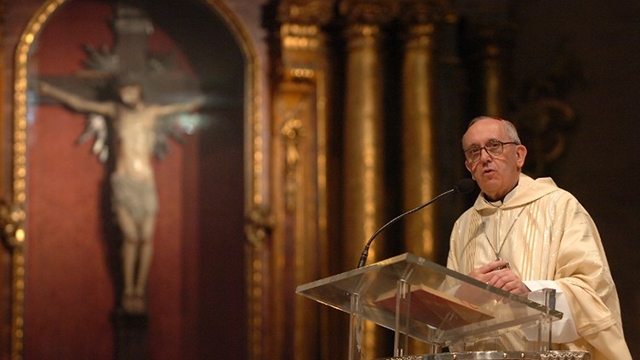
Q: What can Filipino Catholics learn from the new Pope?
I think all Christians around the world, we will learn simplicity from him, being simple, poor. Being simple meaning madaling lapitan, ‘di mayabang, ‘di malaki ang ulo. Simple ang pananamit, ‘di magarang pananamit. We will see a lot of simplicity, making the Church approachable, ‘di malayo, ‘di parang museum. Ibaba niya ang Simbahan. (Being simple means being approachable, humble. He will make the Church approachable, not distant, not like a museum. He will bring it to the people.)
The Church in the Philippines is very much alive but simplicity will be a good teaching for all of us.
Q: Why is simplicity important for the Church at this particular time?
Because isa yan sa mga values ng Panginoong Hesus. If we want a Church more similar to what Jesus said, we have to start with simplicity and poverty. Otherwise, we get attached to power. Sometimes, if we are powerful, we are not easy to be reached by people and therefore a gap can be created between the people and the Church.
I think Pope Francis will really try to bridge that gap. I’m sure he will. – Rappler.com
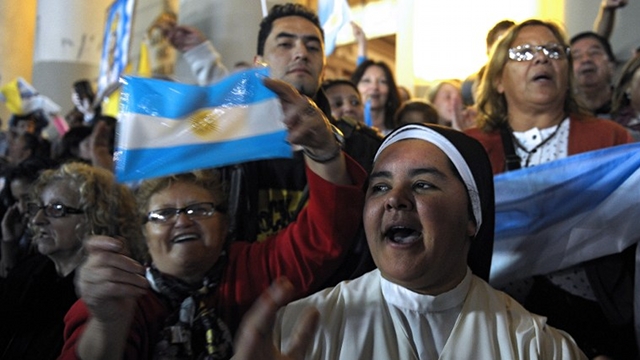
Add a comment
How does this make you feel?
There are no comments yet. Add your comment to start the conversation.